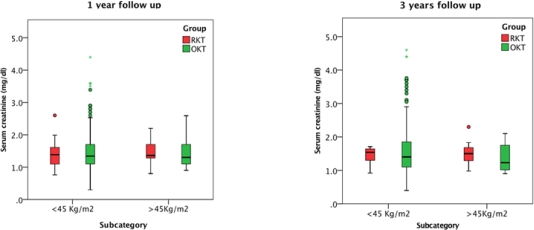Single Center Experience with Robotic Kidney Transplantation for Recipients with BMI >40 kg/m2: A Comparison with the UNOS Registry.
Surgery, University of Illinois, Chicago, IL.
Meeting: 2016 American Transplant Congress
Abstract number: C236
Keywords: Kidney transplantation, Obesity, Outcome, Safety
Session Information
Session Name: Poster Session C: Poster Session 1: Kidney Complications-Other
Session Type: Poster Session
Date: Monday, June 13, 2016
Session Time: 6:00pm-7:00pm
 Presentation Time: 6:00pm-7:00pm
Presentation Time: 6:00pm-7:00pm
Location: Halls C&D
Introduction:Obesity represents a barrier to kidney transplantation, but the increasing prevalence amongst renal failure patients has forced some centers to carefully consider such candidates. Morbidly obese patients may be at increased risk of DGF, higher postoperative complications and inferior graft outcomes. Nevertheless, mortality on the waiting list remains significantly higher than after transplant. We have applied minimally invasive robotic surgery to perform kidney transplant in individuals with BMI[sup3]40kg/m2. We compared our results to the national UNOS database.
Methods: The UNOS registry was reviewed for adult LD kidney transplant recipients with BMI[sup3]40kg/m2 performed from September 2009 to December 2014. We compared transplants performed with robotic technique (RKT) versus patients performed with open surgery at all US centers including our own (OKT). Subgroup analysis in patients with BMI[sup3]45Kg/m2 was conducted. We compared outcomes including patient and graft survival, renal function and technical complications.
Results: RKT group had a significantly higher mean BMI overall. The 1-year patient and graft survival rates were similar between groups. Renal function was also similar at 6, 12 and 36 months (Figure 1). Thrombosis caused 1.3% of the graft losses in OKT and 0% in the RKT group. Interestingly, 52.8% of the overall US experience in patients with BMI[sup3]45 kg/m2 was performed with the robotic technique in our center.
Conclusions: Robotic surgery offers similar patient and graft survival with comparable renal function to open technique. RKT permits transplantation in extreme BMI categories without additional technical complications. Further studies are required to establish the role of RKT for obese candidates but preliminary data is encouraging.

CITATION INFORMATION: Tvetanov I, Garcia Aroz S, Spaggiari M, Hoonbae J, Oberholzer J, Benedetti E. Single Center Experience with Robotic Kidney Transplantation for Recipients with BMI >40 kg/m2: A Comparison with the UNOS Registry. Am J Transplant. 2016;16 (suppl 3).
To cite this abstract in AMA style:
Tvetanov I, Aroz SGarcia, Spaggiari M, Hoonbae J, Oberholzer J, Benedetti E. Single Center Experience with Robotic Kidney Transplantation for Recipients with BMI >40 kg/m2: A Comparison with the UNOS Registry. [abstract]. Am J Transplant. 2016; 16 (suppl 3). https://atcmeetingabstracts.com/abstract/single-center-experience-with-robotic-kidney-transplantation-for-recipients-with-bmi-40-kgm2-a-comparison-with-the-unos-registry/. Accessed January 28, 2026.« Back to 2016 American Transplant Congress
